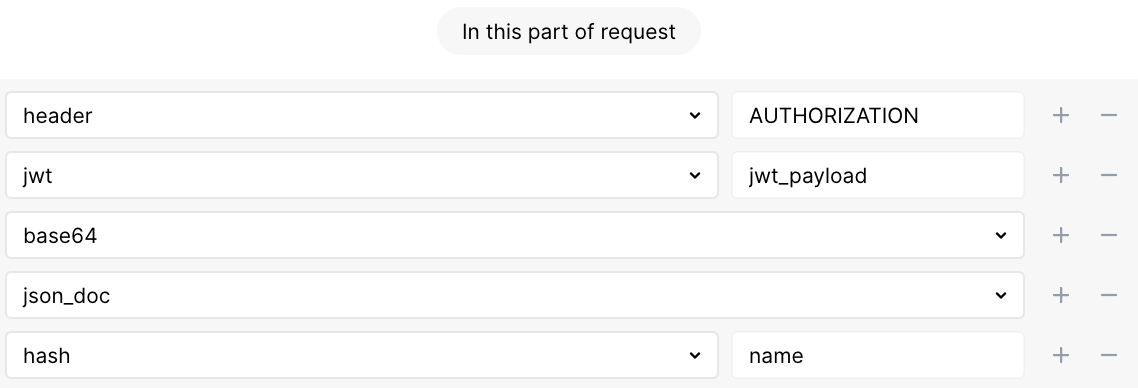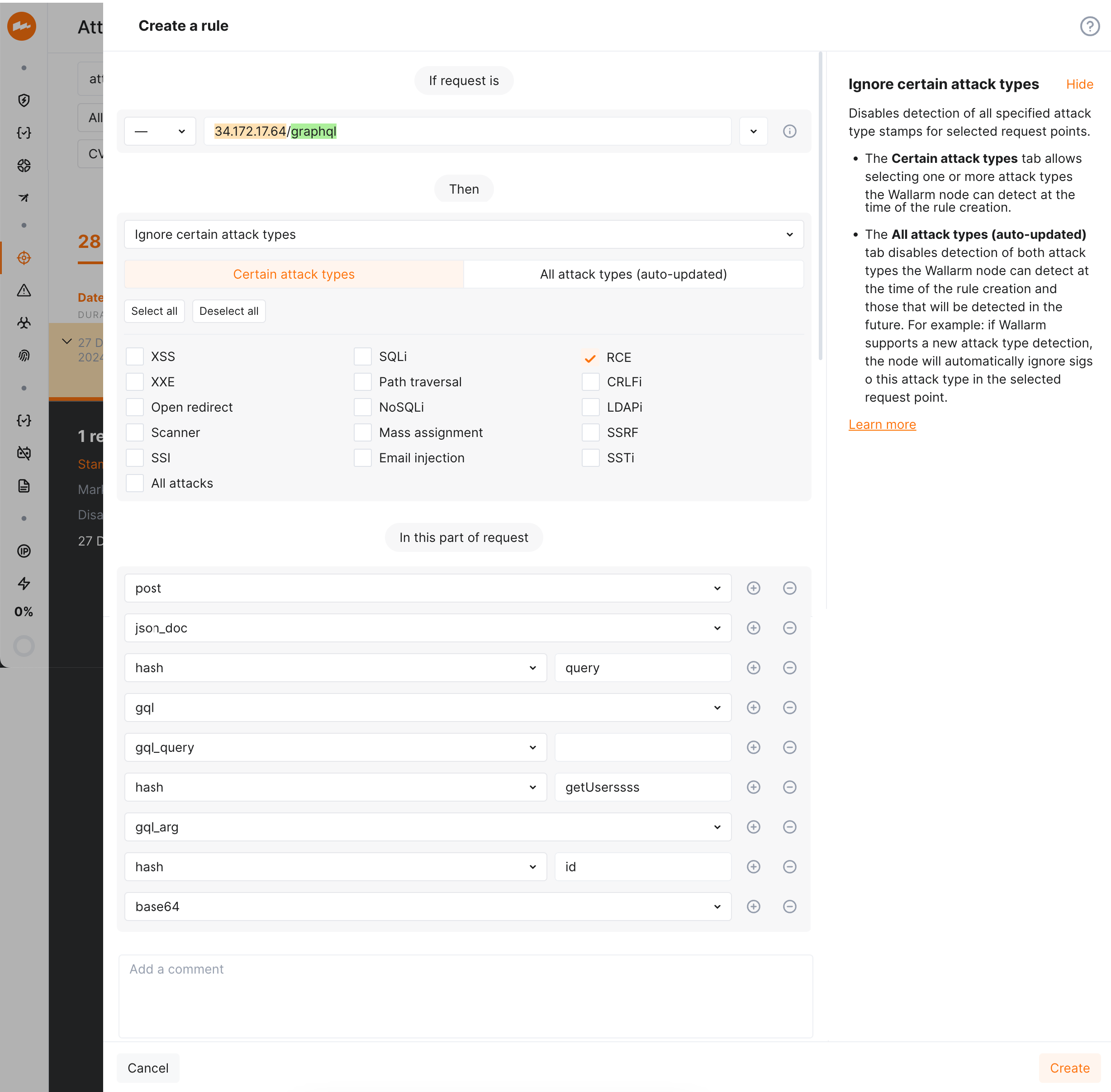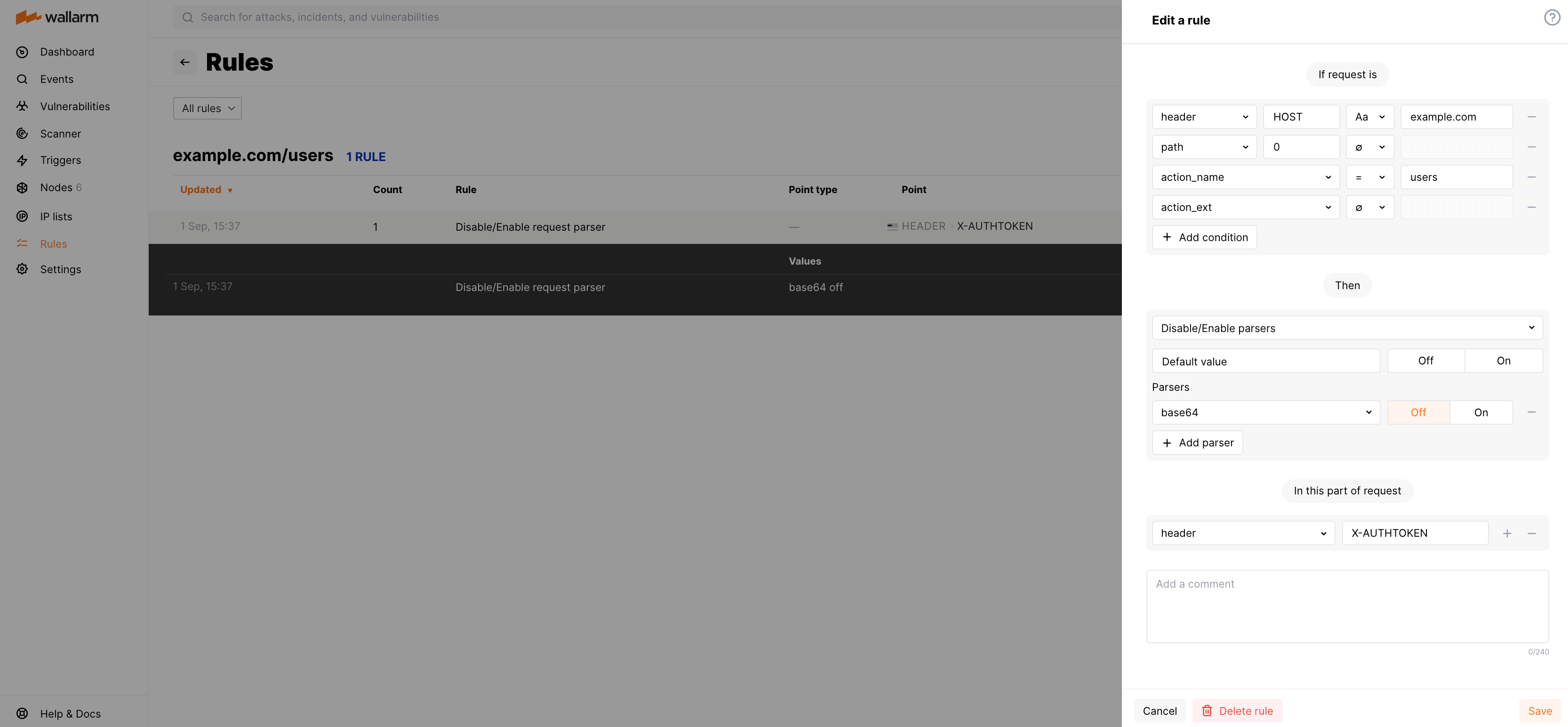Parsing Requests¶
When analyzing requests, Wallarm filtering node uses a comprehensive set of parsers. After identifying the request parts, parsers are sequentially applied to each of them to provide request meta parameters further used for attack detection. Available parsers, logic of their usage and possible configurations for this logic are described in this article.
For an effective parsing, Wallarm follows the principles:
-
Work with the same data as the protected application. For example:
If an application provides a JSON API, then the processed parameters will be also encoded in JSON format. To get parameter values, Wallarm uses JSON parser. There are also more complex cases where the data is encoded several times — for example, JSON to Base64 to JSON. Such cases require decoding with several parsers.
-
Consider the context of data processing. For example:
The parameter
namecan be passed in creation requests both as the product name and as a username. However, the processing code for such requests can be different. To define the method of analyzing such parameters, Wallarm may use the URL from which the requests were sent to or other parameters.
Identifying and parsing the request parts¶
Starting from the top level of the HTTP request, the filtering node attempts to sequentially apply each of the suitable parsers to each part. The list of applied parsers depends on the nature of the data and the results of the previous training of the system.
The output from the parsers becomes an additional set of parameters that has to be analyzed in a similar way. Parser output sometimes becomes a complex structure like JSON, array, or associative array.
Parser tags
Each parser has an identifier (tag). For example, header for the parser of request headers. The set of tags used in the request analysis is displayed in Wallarm Console within the event details. This data demonstrates the request part with the detected attack and parsers that were used.
For example, if an attack was detected in the SOAPACTION header:
URL¶
Each HTTP request contains an URL. To find attacks, the filtering node analyzes both the original value and its individual components: path, action_name, action_ext, query.
The following tags correspond to the URL parser:
-
uri for the original URL value without the domain (for example,
/blogs/123/index.php?q=aaafor the request sent tohttp://example.com/blogs/123/index.php?q=aaa). -
path for an array with URL parts separated by the
/symbol (the last URL part is not included in the array). If there is only one part in the URL, the array will be empty. -
action_name for the last part of the URL after the
/symbol and before the first period (.). This part of the URL is always present in the request, even if its value is an empty string. -
action_ext for the part of the URL after the last period (
.). It may be missing in the request.Boundary between action_name and action_ext when several periods
If there are several periods (
.) in the last part of the URL after the/symbol, problems with the boundary between action_name and action_ext may occur, such as:-
Boundary set based on the first period, for example:
/modern/static/js/cb-common.ffc63abe.chunk.js.map→- ...
action_name—cb-commonaction_ext—ffc63abe.chunk.js.map
-
Some elements are missing after parsing, for the example above this could be:
action_name—cb-commonaction_ext—ffc63abe
To fix this, manually edit the action_name and action_ext points in the advanced edit form of the URI constructor.
-
-
query for query string parameters after the
?symbol.
Example:
/blogs/123/index.php?q=aaa
-
[uri]—/blogs/123/index.php?q=aaa -
[path, 0]—blogs -
[path, 1]—123 -
[action_name]—index -
[action_ext]—php -
[query, 'q']—aaa
Query string parameters¶
Query string parameters are passed to the application in the request URL after the character ? in the key=value format. The query tag corresponds to the parser.
| Request example | Query string parameters and values |
|---|---|
/?q=some+text&check=yes |
|
/?p1[x]=1&p1[y]=2&p2[]=aaa&p2[]=bbb |
|
/?p3=1&p3=2 |
|
IP address of a request origin¶
Request point for an IP address of a request origin in the Wallarm rules is remote_addr. This point is used only in the Advanced rate limiting rule to limit requests per IPs.
Headers¶
Headers are presented in the HTTP request and some other formats (e.g., multipart). The header tag corresponds to the parser. Header names are always converted to uppercase.
Example:
-
[header, 'HOST']—example.com -
[header, 'X-TEST', array, 0]—aaa -
[header, 'X-TEST', array, 1]—aaa -
[header, 'X-TEST', pollution]—aaa,bbb
Metadata¶
The following tags correspond to the parser for HTTP request metadata:
-
post for the HTTP request body
-
method for the HTTP request method:
GET,POST,PUT,DELETE -
proto for the HTTP protocol version
-
scheme: http/https
-
application for the application ID
Additional parsers¶
Complex request parts may require additional parsing (for example, if the data is Base64 encoded or presented in the array format). In such cases, the parsers listed below are applied to request parts additionally.
base64¶
Decodes Base64 encoded data, and can be applied to any part of the request.
gzip¶
Decodes GZIP encoded data, and can be applied to any part of the request.
htmljs¶
Converts HTML and JS symbols to the text format, and can be applied to any part of the request.
Example: "aaa" will be converted to "aaa".
json_doc¶
Parses the data in JSON format, and can be applied to any part of the request.
Filters:
-
json_array or array for the value of the array element
-
json_obj or hash for the value of the associative array key (
key:value)
Example:
-
[..., json_doc, hash, 'p1']—value -
[..., json_doc, hash, 'p2', array, 0]—v1 -
[..., json_doc, hash, 'p2', array, 1]—v2 -
[..., json_doc, hash, 'p3', hash, 'somekey']—somevalue
xml¶
Parses the data in XML format, and can be applied to any part of the request.
Filters:
-
xml_comment for an array with comments in the body of an XML document
-
xml_dtd for the address of the external DTD schema being used
-
xml_dtd_entity for an array defined in the Entity DTD document
-
xml_pi for an array of instructions to process
-
xml_tag or hash for an associative array of tags
Formatting xml_tag with namespaces
If you specify URI, namespace and tag name together in xml_tag, note that the required separator depends on the Wallarm node version:
URI|namespace|tag_namein versions 6.3.0 and later, e.g.https://www.w3.org/path|xhtml|htmlURI:namespace:tag_namein versions earlier than 6.3.0, e.g.,https://www.w3.org/path:xhtml:html
-
xml_tag_array or array for an array of tag values
-
xml_attr for an associative array of attributes; can only be used after the xml_tag filter
The XML parser does not differentiate between the contents of the tag and the first element in the array of values for the tag. That is, the parameters [..., xml, xml_tag, 't1'] and [..., xml, xml_tag, 't1', array, 0] are identical and interchangeable.
Example:
<?xml version="1.0"?>
<!DOCTYPE foo [<!ENTITY xxe SYSTEM "aaaa">]>
<?xml-stylesheet type="text/xsl" href="style.xsl"?>
<!-- test -->
<methodCall>
<methodName>&xxe;</methodName>
<methodArgs check="true">123</methodArgs>
<methodArgs>234</methodArgs>
</methodCall>
-
[..., xml, xml_dtd_entity, 0]— name =xxe, value =aaaa -
[..., xml, xml_pi, 0]— name =xml-stylesheet, value =type="text/xsl" href="style.xsl" -
[..., xml, xml_comment, 0]—test -
[..., xml, xml_tag, 'methodCall', xml_tag, 'methodName']—aaaa -
[..., xml, xml_tag, 'methodCall', xml_tag, 'methodArgs']—123 -
[..., xml, xml_tag, 'methodCall', xml_tag, 'methodArgs', xml_attr, 'check']—true -
[..., xml, xml_tag, 'methodCall', xml_tag, 'methodArgs', array, 1]—234
array¶
Parses data array. Can be applied to any part of the request.
Example:
-
[query, 'p2', array, 0]—aaa -
[query, 'p2', array, 1]—bbb
hash¶
Parses the associative data array (key:value), and can be applied to any part of the request.
Example:
-
[query, 'p1', hash, 'x']—1 -
[query, 'p1', hash, 'y']—2
pollution¶
Combines the values of the parameters with the same name, and can be applied to any part of the request in the initial or decoded format.
Example:
[query, 'p3', pollution]—1,2
percent¶
Decodes the URL symbols, and can be applied only to the uri component of URL.
cookie¶
Parses the Cookie request parameters, and can be applied only to the request headers.
Example:
-
[header, 'COOKIE', cookie, 'a']=1; -
[header, 'COOKIE', cookie, 'b']=2.
form_urlencoded¶
Parses the request body passed in the application/x-www-form-urlencoded format, and can be applied only to the request body.
Example:
-
[post, form_urlencoded, 'p1']—1 -
[post, form_urlencoded, 'p2', hash, 'a']—2 -
[post, form_urlencoded, 'p2', hash, 'b']—3 -
[post, form_urlencoded, 'p3', array, 0]—4 -
[post, form_urlencoded, 'p3', array, 1]—5 -
[post, form_urlencoded, 'p4', array, 0]—6 -
[post, form_urlencoded, 'p4', array, 1]—7 -
[post, form_urlencoded, 'p4', pollution]—6,7
Parses gRPC API requests, and can be applied only to the request body.
Supports the protobuf filter for the Protocol Buffers data.
multipart¶
Parses the request body passed in the multipart format, and can be applied only to the request body.
Supports the header filter for the headers in the request body.
Example:
-
[post, multipart, 'p1']—1 -
[post, multipart, 'p2', hash, 'a']—2 -
[post, multipart, 'p2', hash, 'b']—3 -
[post, multipart, 'p3', array, 0]—4 -
[post, multipart, 'p3', array, 1]—5 -
[post, multipart, 'p4', array, 0]—6 -
[post, multipart, 'p4', array, 1]—7 -
[post, multipart, 'p4', pollution]—6,7
If a file name is specified in the Content-Disposition header, then the file is considered to be loaded in this parameter. The parameter will look like this:
[post, multipart, 'someparam', file]— file contents
viewstate¶
Designed to analyze the session state. The technology is used by Microsoft ASP.NET, and can be applied only to the request body.
Filters:
-
viewstate_array for an array
-
viewstate_pair for an array
-
viewstate_triplet for an array
-
viewstate_dict for an associative array
-
viewstate_dict_key for a string
-
viewstate_dict_value for a string
-
viewstate_sparse_array for an associative array
jwt¶
Parses JWT tokens and can be applied to any part of the request.
The JWT parser returns the result in the following parameters according to the detected JWT structure:
-
jwt_prefix: one of the supported JWT value prefixes - lsapi2, mobapp2, bearer. The parser reads the prefix value in any register. -
jwt_header: JWT header. Once getting the value, Wallarm also usually applies thebase64andjson_docparsers to it. -
jwt_payload: JWT payload. Once getting the value, Wallarm also usually applies thebase64andjson_docparsers to it.
JWTs can be passed in any request part. So, before applying the jwt parser Wallarm uses the specific request part parser, e.g. query or header.
Example of the JWT passed in the Authentication header:
Authentication: Bearer eyJhbGciOiJIUzI1NiIsInR5cCI6IkpXVCJ9.eyJzdWIiOiIxMjM0NTY3ODkwIiwibmFtZSI6IkpvaG4gRG9lIiwiaWF0IjoxNTE2MjM5MDIyfQ.SflKxwRJSMeKKF2QT4fwpMeJf36POk6yJV_adQssw5c
-
[header, AUTHENTICATION, jwt, 'jwt_prefix']—Bearer -
[header, AUTHENTICATION, jwt, 'jwt_header', base64, json_doc, hash, 'alg']—HS256 -
[header, AUTHENTICATION, jwt, 'jwt_header', base64, json_doc, hash, 'typ']—JWT -
[header, AUTHENTICATION, jwt, 'jwt_payload', base64, json_doc, hash, 'sub']—1234567890 -
[header, AUTHENTICATION, jwt, 'jwt_payload', base64, json_doc, hash, 'name']—John Doe -
[header, AUTHENTICATION, jwt, 'jwt_payload', base64, json_doc, hash, 'iat']—1516239022
When defining a request element the rule is applied to:
-
Choose the parser of the request part containing JWT first
-
Specify one of the listed
jwt_*parameters as thejwtparser value, e.g. for thenameJWT payload parameter value:
gql¶
Parses GraphQL executable definitions (queries, mutations, subscriptions and fragments) that enables an improved detection of the input validation attacks in GraphQL specific request points. Requires NGINX Node 5.3.0 or higher or native node 0.12.0.
Filters:
- gql_query for a query operation
- gql_mutation for a mutation operation
- gql_subscription for a subscription operation
- gql_alias for a field alias
- gql_arg for field arguments
- gql_dir for a directive
- gql_spread for a fragment spread
- gql_fragment for a fragment definition
- gql_type for the named type of a fragment definition or inline fragment
- gql_inline for an inline fragment
- gql_var for a variable definition
Examples:
-
[..., gql, gql_query, 'GetUser', hash, 'user', gql_arg, hash, 'id']—1 -
[..., gql, gql_query, 'GetUser', hash, 'user', gql_spread,'UserFields', gql_dir, 'include', gql_arg, hash, 'if']—true
-
[..., gql, gql_query, 'GetAllUsers', hash, 'users', gql_arg, hash, 'limit']—10 -
[..., gql, gql_query, 'GetAllUsers', hash, 'users',gql_spread, 'UserFields', gql_dir, 'include', gql_arg, hash, 'if']—true
[..., gql, gql_fragment, 'UserFields', gql_type,'User', hash, 'posts', gql_arg, hash, 'status']—published
The parser allows extracting and displaying values of GraphQL request parameters in API Sessions and applying rules to GraphQL specific parts of requests:
GraphQL protection with Wallarm
While always enabled parser by default provides detection of regular attacks (SQLi, RCE, etc.) in GraphQL, Wallarm also allow configuring protection from GraphQL-specific attacks.
Norms¶
The norms are applied to parsers for array and key data types. Norms are used to define the boundaries of data analysis. The value of the norm is indicated in the parser tag. For example: hash_all, hash_name.
If the norm is not specified, then the identifier of the entity that requires processing is passed to the parser. For example: the name of the JSON object or other identifier is passed after hash.
all
Used to get values of all elements, parameters, or objects. For example:
-
path_all for all parts of URL path
-
query_all for all query string parameter values
-
header_all for all header values
-
array_all for all array element values
-
hash_all for all JSON object or XML attribute values
-
jwt_all for all JWT values
name
Used to get names of all elements, parameters, or objects. For example:
-
query_name for all query string parameter names
-
header_name for all header names
-
hash_name for all JSON object or XML attribute names
-
jwt_name for names of all parameters with JWT
Managing parsers¶
By default, when analyzing the request the Wallarm node attempts to sequentially apply each of the suitable parsers to each element of the request. However, certain parsers can be applied mistakenly and as a result, the Wallarm node may detect attack signs in the decoded value.
For example: the Wallarm node may mistakenly identify unencoded data as encoded into Base64, since the Base64 alphabet symbols are often used in the regular text, token values, UUID values and other data formats. If decoding the unencoded data and detecting attack signs in the resulting value, the false positive occurs.
To prevent false positives in such cases, Wallarm provides the Disable/Enable request parser rule to disable the parsers mistakenly applied to certain request elements.
Creating and applying the rule
-
Proceed to Wallarm Console:
- Rules → Add rule or your branch → Add rule.
- Attacks / Incidents → attack/incident → hit → Rule.
- API Discovery (if enabled) → your endpoint → Create rule.
-
Choose Fine-tuning attack detection → Configure parsers.
-
In If request is, describe the scope to apply the rule to.
-
Add parsers to be
off/on. -
In In this part of request, specify request points for which you wish to set the rule. Wallarm will restrict requests that have the same values for the selected request parameters.
All available points are described in this article above, you can choose those matching your particular use case.
-
Wait for the rule compilation and uploading to the filtering node to complete.
Rule example
Let us say the requests to https://example.com/users/ require the authentication header X-AUTHTOKEN. The header value may contain specific symbol combinations (e.g. = in the end) that may be potentially decoded by Wallarm with the parser base64 resulting in false detection of attack sign. You need to prevent this decoding to avoid false positives.
To do so, set the rule as displayed on the screenshot:




